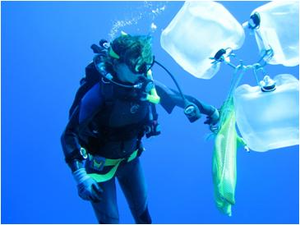Tracey McDole: Difference between revisions
From Santa Fe Institute Events Wiki
No edit summary |
No edit summary |
||
| (3 intermediate revisions by the same user not shown) | |||
| Line 1: | Line 1: | ||
[[image:Waterjugs.png|thumb|collecting reef-water]] | |||
I am a PhD student (year 4) in the Cell and Molecular Biology department at San Diego State University in California. The general focus of the lab I work in revolves around microbial and viral community analysis of different systems; the main places where we study microbes and viruses are on coral reefs and in the CF lung. I am associated with the coral reef research. | I am a PhD student (year 4) in the Cell and Molecular Biology department at San Diego State University in California. The general focus of the lab I work in revolves around microbial and viral community analysis of different systems; the main places where we study microbes and viruses are on coral reefs and in the CF lung. I am associated with the coral reef research. | ||
| Line 21: | Line 22: | ||
Network dynamics in ecosystems trying to cope with the affects of human impact | Network dynamics in ecosystems trying to cope with the affects of human impact | ||
Modeling the total ammount of incoming energy to a reef system | Modeling the total ammount of incoming energy to a reef system | ||
Microbial community size structure on healthy vs. degraded reefs | Microbial community size structure on healthy vs. degraded reefs | ||
Latest revision as of 20:42, 5 May 2010

I am a PhD student (year 4) in the Cell and Molecular Biology department at San Diego State University in California. The general focus of the lab I work in revolves around microbial and viral community analysis of different systems; the main places where we study microbes and viruses are on coral reefs and in the CF lung. I am associated with the coral reef research.
Rohwer Lab Link: http://phage.sdsu.edu/
1. What are your main interests?
Coral reef ecosystem dynamics and bioenergetics
2. What sort of expertise can you bring to the group?
I began investigating the topic of coral reef bioenergetics using body size allometry (specifically MTE) as a tool to make community-level and ecosystem-level predictions about healthy and degraded reef systems. Metabolic theory of ecology speaks about biological systems in the language of thermodynamics and mathematics. Many of the participants at SFRI are people who are bringing their expertise in math and computer sciences to biological problems. I hope that my expertise in the biological sciences will enhance the group's ability to attack these types of problems from a more realistic perspective.
3. What do you hope to get out of the CSSS?
One of the reasons why I want to take this summer course rather than another field course in coral reef ecology is because I know that SFRI will expand my ability to think about complex systems. I am attending some conferences this summer, and I hope to promote the integrative style of thinking that SFRI fosters within the coral reef community.
Visiting SFRI will also be an opportunity to make connections with experts in the field of metabolic theory and to obtain feedback on what I have done and where I am going. It would be wonderful to confirm that I have applied metabolic theory correctly. If not, what needs to be done to ensure that my data is accurately presented to the scientific community? The last thing I want to do is to propagate more confusion on this topic.
4. Do you have any possible projects in mind for the CSSS?
Network dynamics in ecosystems trying to cope with the affects of human impact
Modeling the total ammount of incoming energy to a reef system
Microbial community size structure on healthy vs. degraded reefs
